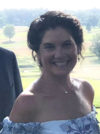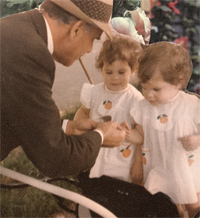About Maryam

Hi! I’m Maryam, the younger (by two minutes) of the twins. When learning that I would have to come up with some website content for our book’s website, I initially drew a blank. As a very private person I could not think of a thing anyone needed to know about me, or more truthfully, anything I wanted people to know about me. But then I had an ‘Aha!’ moment when I realized that for many years I have been thinking about the books that have had an effect on my life. So rather than talk about myself, I’ll let the books do the talking for me. While novels absorbed my childhood, currently I prefer biography, memoir, books that expose me to new (to me) ideas or concepts, and history. Deep into the William Manchester trilogy The Last Lion, a biography of Winston Churchill, I attempted to explain to my husband my enthusiasm for it: “I love going to bed now!” His reaction was not what I’d intended.
In the past several years I have been accused of being brainwashed, and while that annoyed me for quite some time, I now boldly stand guilty-as-charged and proclaim myself
Childhood:

The Tale of Jemima Puddleduck by Beatrix Potter. This was the first book I remember owning, and I can still, in my mind’s eye, see my father’s printing in red ink on the frontispiece: To Maryam, Love Daddy. I inherited his talent for brevity.
A Little Princess by Frances Hodgson Burnett. This is the second book I owned, having received it as a Christmas present, whether from Santa Claus or my parents I can’t remember. I raced through the book and was relieved that I hadn’t been given Hans Brinker and the Silver Skates, (the book my sister had received the same Christmas) because it seemed too difficult. And while I didn’t read The Secret Garden, also by Burnett, until somewhat later, I now count that as among my favorite books as well.
The “Fatty Books” by Enid Blyton. That wasn’t the real name, just how we referred to them. These detective books had been given to our older siblings by their friends who had lived in England. We devoured them.
All Agatha Christie mysteries. When I became immersed in these books, I found it difficult to believe one could read a book that wasn’t a mystery.
Gone With the Wind by Margaret Mitchell. This was the first “grown-up” novel I read, and I was stunned to find out it was basically one big romance. I thought novels meant dull, boring, history-like books. Re-reading the book every five years or so, what I considered at fourteen to be the “boring” parts have become by far the most interesting!
The Forsyte Saga by John Galsworthy. I was given a paperback set of these books by a Chinese friend of mine when I was nineteen. I raced through them, and continue to read them, like Gone With the Wind, every five years or so, and continue to enjoy them with a new perspective each time.
Adulthood, in order of appearance, as well as I can remember:
The Bible by God. This probably belongs in the childhood section, since I remember pouring over The Children’s Illustrated Bible when young. However, I never read it through until my twenties, and have read it several times since then. To be honest, I read the Bible because, for one, I say I believe it and therefore think I should know what’s in it. Also, I think it’s good for me. If I could only own one book, it would be the Bible.
Back to Eden by Jethro Kloss. Again, this probably belongs in the childhood section since my mother brought a copy home when I was about ten, and our eating habits were changed because of its effect on her. However, I bought my own copy as an adult, and often use it as a reference book when having any health issues. This book, like so many of the ones that have affected me, is basically common sense, but common sense is something that we don’t seem to find much of these days. Its principles are also simple. It seems to me that most subjects in life are simple. But let an “expert” get involved and before you know it there is more confusion on the topic than one would think possible.
Mind Over Back Pain and The Mindbody Prescription by John E. Sarno, M.D. My mother introduced me to Mind Over Back Pain, and, though at that time I had not read it, I saw the effect it had on her. She went through a period of suffering from severe back pain; I would come home from work and find her lying in agony on the floor. But after she read this book the pain dissipated, and soon disappeared. She always said Dr. Sarno had taken away the fear of backpain. I finally read the book in my twenties, and fortunately, (because of this book, I believe) have never suffered back pain. When I do feel some pain in my neck, knee, elbow, sciatic nerve or wherever, I practice the philosophy of Dr. Sarno and all is well!
Economics in One Lesson by Henry Hazlitt. I found a copy of this while staying at my brother’s house. It was the beginning of my economic education, despite having previously taken a course in the subject at college, a course which left me more confused than before I took the class. (See Back to Eden entry).
The Timeless Way of Building and A Pattern Language by Christopher Alexander. Another author introduced to me by my brother, these books opened my eyes to the structural world. An education in architecture everyone would benefit by reading.
The Road Less Traveled by Scott Peck. What a fascinating eye-opener this book is. I was introduced to it in my mid-thirties and wish I had read it when much younger. A must-read, in my opinion, for anyone who wants to understand and improve a relationship, whether husband/wife, parent/child, boss/employee, friend/friend. It is also an exceptional guidebook for personal spiritual growth. Mr. Peck also wrote People of the Lie: The Hope for Healing Human Evil, which examines evil in the world. Frightening and enlightening.
Merry Hall by Beverly Nichols. This book, as well as the many others by Beverly Nichols, came into my life at the same time as home and garden ownership did. All are a laugh-aloud treat to read. And I’ll always remember his observation upon buying a piano before he had furniture: ‘The necessities will take care of themselves” . . . or something to that effect!
The Road to Serfdom by Friedrich A. Hayek. Why this isn’t required reading for every American student I’ll never know.
Basic Economics: A Common Sense Guide to the Economy by Thomas Sowell. Very simply, an economic eye-opener.
The Education Revolution by Ron Paul. An expose of the American public-school system. He describes what our mother discovered on her own: that a top-down, government-run education system not only doesn’t work, it cannot work.
The Glass Castle by Jeannette Walls. After my sister gave me this book to read, I was somewhat disheartened—she’s written our book! It is marvelously written, and a joy to read. I can only hope to aspire to that level of writing.
